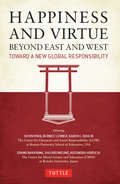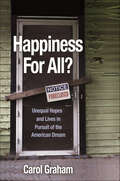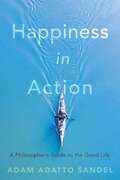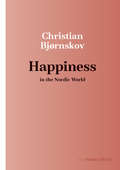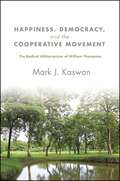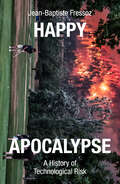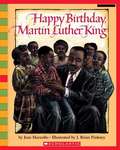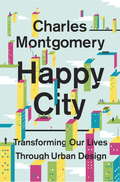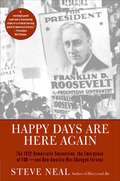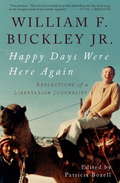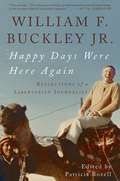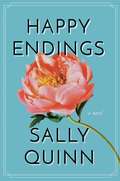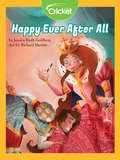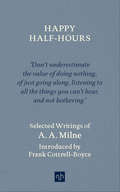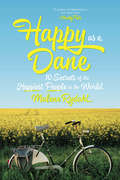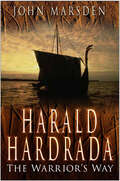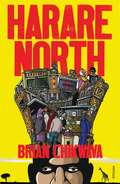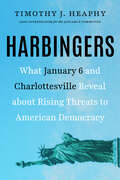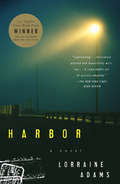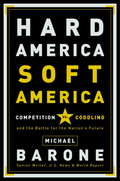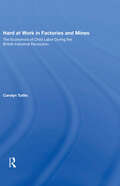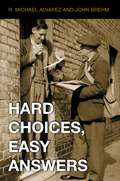- Table View
- List View
Happily Ever After Rescue Team: Agents of H.E.A.R.T. (Agents of H.E.A.R.T. #1)
by Sam HayA young girl’s wish to help out in her family’s seaside café gets out of hand when she accidentally summons a rescue squad of fairytale princesses in this first book of a fun new illustrated chapter book series, Happily Ever After Rescue Team: Agents of H.E.A.R.T.! After her parents move the family to a new town, all Evie wants is to help out in their new café. But nobody wants a kid—no matter how wonderful of a waitress they are—underfoot. And she does have an unfortunate habit of dropping, and spilling, and crashing!But, she also has a knack for super-fantastic dessert ideas that could win the best café contest—if only her dad and stepmom would listen!When her frustrated wish to help accidentally summons a group of fairytale princesses right out of a storybook, Evie finds herself busy fending off their well-meaning attempts to “rescue” her. Agents of HEART? More like agents of chaos!…she’s keeping the puppy though. In the first book of a new series by Spy Penguins author, Sam Hay, Evie learns that new friends, a good book, and a lot of heart are all the ingredients she needs for her own happily ever after.
Happily Ever After: Companion to the Selection Series (The Selection Novella)
by Kiera CassMeet Prince Maxon before he fell in love with America, and a girl named Amberly before she became queen. See the Selection through the eyes of a guard who watched his first love drift away and a girl who fell for a boy who wasn't the prince. This gorgeous collection features four novellas from the captivating world of Kiera Cass's #1 New York Times bestselling Selection series, as well as exclusive, never-before-seen bonus content.This series companion is a must-have for any Selection fan, and includes: The Prince The Guard The Queen The Favorite Exclusive new scenes from The Selection, The Elite, and The One Introductions to each novella from Kiera Cass A map of Illéa and other illustrations And more!
Happiness and Virtue Beyond East and West
by Kevin Ryan Karen E. Bohlin Osamu Nakayama Kazunobu Horiuchi Bernice LernerHappiness and Virtue Beyond East and West presents an important series of essays from Japanese and American authors examining essential virtues shared by both Eastern and Western cultures with the ultimate goal of allowing happiness to be realized in a globally and socially responsible manner.Each chapter examines one of nine virtues-Courage, Justice, Benevolence, Gratitude, Wisdom, Reflection, Respect, Responsibility and Temperance-and the importance of each in our lives.With clarity of purpose the essays demonstrate that the virtues and happiness that living a good life can bring know no national boundaries. It is the sincere hope of the editors and authors that this book will help its readers reexamine the timeless question of what constitutes true happiness and a good life and will therefore play some part in increasing international cooperation and good will.
Happiness for All?: Unequal Hopes and Lives in Pursuit of the American Dream
by Carol GrahamHow the optimism gap between rich and poor is creating an increasingly divided societyThe Declaration of Independence states that all people are endowed with certain unalienable rights, and that among these is the pursuit of happiness. But is happiness available equally to everyone in America today? How about elsewhere in the world? Carol Graham draws on cutting-edge research linking income inequality with well-being to show how the widening prosperity gap has led to rising inequality in people's beliefs, hopes, and aspirations.For the United States and other developed countries, the high costs of being poor are most evident not in material deprivation but rather in stress, insecurity, and lack of hope. The result is an optimism gap between rich and poor that, if left unchecked, could lead to an increasingly divided society. Graham reveals how people who do not believe in their own futures are unlikely to invest in them, and how the consequences can range from job instability and poor education to greater mortality rates, failed marriages, and higher rates of incarceration. She describes how the optimism gap is reflected in the very words people use—the wealthy use words that reflect knowledge acquisition and healthy behaviors, while the words of the poor reflect desperation, short-term outlooks, and patchwork solutions. She also explains why the least optimistic people in America are poor whites, not poor blacks or Hispanics.Happiness for All? highlights the importance of well-being measures in identifying and monitoring trends in life satisfaction and optimism—and misery and despair—and demonstrates how hope and happiness can lead to improved economic outcomes.
Happiness in Action: A Philosopher’s Guide to the Good Life
by Adam Adatto Sandel“Here, at last, is a book about what happiness really means, and why it often eludes us in our stressed-out, always-on lives.”—Arianna Huffington, Founder and CEO, ThriveA young philosopher and Guinness World Record holder in pull-ups argues that the key to happiness is not goal-driven striving but forging a life that integrates self-possession, friendship, and engagement with nature.What is the meaning of the good life? In this strikingly original book, Adam Adatto Sandel draws on ancient and modern thinkers and on two seemingly disparate pursuits of his own, philosophy and fitness, to offer a surprising answer to this age-old human question.Sandel argues that finding fulfillment is not about attaining happiness, conceived as a state of mind, or even about accomplishing one’s greatest goals. Instead, true happiness comes from immersing oneself in activity that is intrinsically rewarding. The source of meaning, he suggests, derives from the integrity or “wholeness” of self that we forge throughout the journey of life.At the heart of Sandel’s account of life as a journey are three virtues that get displaced and distorted by our goal-oriented striving: self-possession, friendship, and engagement with nature. Sandel offers illuminating and counterintuitive accounts of these virtues, revealing how they are essential to a happiness that lasts.To illustrate the struggle of living up to these virtues, Sandel looks to literature, film, and television, and also to his own commitments and adventures. A focal point of his personal narrative is a passion that, at first glance, is as narrow a goal-oriented pursuit as one can imagine: training to set the Guinness World Record for Most Pull-Ups in One Minute. Drawing on his own experiences, Sandel makes philosophy accessible for readers who, in their own infinitely various ways, struggle with the tension between goal-oriented striving and the embrace of life as a journey.
Happiness in the Nordic World (Nordic World)
by Christian BjørnskovDenmark is consistently among the countries with the happiest and most satisfied populations, and it regularly places at the very top with the rest of the Nordic countries in international surveys. Why do the Nordic countries as a whole constitute the happiest region in the world? Many experts attribute the region's high levels of happiness to factors such as greater relative national wealth and well-functioning institutions. Yet, a number of other countries in Europe and parts of Asia share those qualities and rank far lower in life satisfaction. Others credit the region's high levels of happiness to its welfare state model, but these have changed considerably over time—and Iceland does not share this feature. Instead, economist Christian Bjørnskov argues that the most important factor to come out of international comparisons is the importance of social trust—the ability to trust other people one does not know personally. The populations in three of the five countries are also characterized by a very strong sense of personal freedom. These two key factors contribute to a fuller and richer life. Bjørnskov ends by discussing to what extent these factors can be exported to other parts of the world.
Happiness, Democracy, and the Cooperative Movement: The Radical Utilitarianism of William Thompson (SUNY series in New Political Science)
by Mark J. KaswanHappiness is political. The way we think about happiness affects what we do, how we relate to other people and the world around us, our moral principles, and even our ideas about how society should be organized. Utilitarianism, a political theory based on hedonistic and individualistic ideas of happiness, has been dominated for more than two-hundred years by its founder, Jeremy Bentham. In Happiness, Democracy, and the Cooperative Movement, Mark J. Kaswan examines the work of William Thompson, a friend of Bentham's who nonetheless offers a very different utilitarian philosophy and political theory based on a different conception of happiness, but whose work has been largely overlooked. Kaswan reveals the importance of our ideas about happiness for our understanding of the basic principles and nature of democracy, its role in society and its character as a social institution. In what is the closest examination of Thompson's political theory to date, Kaswan moves from philosophy to theory to practice, starting with conceptions of happiness before moving to theories of utility, then to democratic theory, and finally to practice in the first detailed account of how Thompson's ideas laid the foundations for the cooperative movement, which is now the world's largest democratic social movement.
Happy Apocalypse: A History of Technological Risk
by Jean-Baptiste FressozHow risk, disasters and pollution were managed and made acceptable during the Industrial RevolutionBeing environmentally conscious is not nearly as modern as we imagine. As a mode of thinking it goes back hundreds of years. Yet we typically imagine ourselves among the first to grasp the impact humanity has on the environment. Hence there is a fashion for green confessions and mea culpas.But the notion of a contemporary ecological awakening leads to political impasse. It erases a long history of environmental destruction. Furthermore, by focusing on our present virtues, it overlooks the struggles from which our perspective arose.In response, Happy Apocalypse plunges us into the heart of controversies that emerged in the eighteenth and nineteenth centuries around factories, machines, vaccines and railways. Jean-Baptiste Fressoz demonstrates how risk was conceived, managed, distributed and erased to facilitate industrialization. He explores how clinical expertise around 1800 allowed vaccination to be presented as completely benign, how the polluter-pays principle emerged in the nineteenth century to legitimize the chemical industry, how safety norms were invented to secure industrial capital and how criticisms and objections were silenced or overcome to establish technological modernity.Societies of the past did not inadvertently alter their environments on a massive scale. Nor did they disregard the consequences of their decisions. They seriously considered them, sometimes with dread. The history recounted in this book is not one of a sudden awakening but a process of modernising environmental disinhibition.
Happy Birthday, Martin Luther King (Fountas & Pinnell LLI Blue: Level L)
by Jean Marzollo J. PinkneyThis book is a beautifully-rendered study of Martin Luther King Jr.'s life, told in simple, straightforward language for even the youngest of readers to understand. Pinkney's scratchboard and oil pastel illustrations convey both the strength and gentleness of King's character. Both text and art carry his central message of peace and brotherhood among all people.
Happy City
by Charles MontgomeryCharles Montgomery's Happy City will revolutionize the way we think about urban life.After decades of unchecked sprawl, more people than ever are moving back to the city. Dense urban living has been prescribed as a panacea for the environmental and resource crises of our time. But is it better or worse for our happiness? Are subways, sidewalks and condo towers an improvement on the car-dependence of sprawl?The award-winning journalist Charles Montgomery finds answers to such questions at the intersection between urban design and the emerging science of happiness, during an exhilarating journey through some of the world's most dynamic cities. He meets the visionary mayor who introduced a "sexy" bus to ease status anxiety in Bogotá; the architect who brought the lessons of medieval Tuscan hill towns to modern-day New York City; the activist who turned Paris's urban freeways into beaches; and an army of American suburbanites who have hacked the design of their own streets and neighborhoods.Rich with new insights from psychology, neuroscience and Montgomery's own urban experiments, Happy City reveals how our cities can shape our thoughts as well as our behavior. The message is as surprising as it is hopeful: by retrofitting cities and our own lives for happiness, we can tackle the urgent challenges of our age. The happy city can save the world--and all of us can help build it.
Happy Days Are Here Again: The 1932 Democratic Convention, the Emergence of FDR—and How America Was Changed Forever
by Steven NealPolitical conventions in years past were more than pep rallies for preselected candidates -- they were suspenseful, no-holds-barred battles for the nomination. In 1932, Franklin Delano Roosevelt, the man who would become one of America's most beloved presidents, was far from a shoo-in for the Democratic nomination at the party's convention in Chicago. Using new sources of information, award-winning reporter Steve Neal weaves the compelling story of how FDR finally got the nod along with the personalities of the day who influenced the decision, including Joseph P. Kennedy, Al Smith, Huey Long, and William Randolph Hearst.
Happy Days Were Here Again: Reflections of a Libertarian Journalist
by William F. Buckley Jr. Patricia BozellIn Happy Days Were Here Again, William F. Buckley Jr. offers a collection of his finest essays from the latter part of his long career. Sometimes celebrating, sometimes assailing, Buckley takes on opponents ranging from Mikhail Gorbachev to Carl Sagan to Leonard Bernstein; reflects on the academic scene, the Gulf War, and the idea of sin; and offers appreciations of friends, both right and left. For everyone who appreciates the wit and style of America's pre-eminent conservative, this is a must-have collection.
Happy Days Were Here Again: Reflections of a Libertarian Journalist
by William F. Buckley Jr.In "Happy Days Were Here Again", William F. Buckley Jr. offers a collection of his finest essays from the latter part of his long career. Sometimes celebrating, sometimes assailing, Buckley takes on opponents ranging from Mikhail Gorbachev to Carl Sagan to Leonard Bernstein; reflects on the academic scene, the Gulf War, and the idea of sin; and offers appreciations of friends, both right and left. For everyone who appreciates the wit and style of America's preeminent conservative, this is a must-have collection.
Happy Endings: A Novel
by Sally QuinnFrom author Sally Quinn comes a gripping novel about two women who must learn to cope with unexpected changes and the trials of romance.Former First Lady Sadie Grey has been devastated by tragedy. Allison Sterling is dynamic, sexy, and famous, a successful reporter who now finds herself yearning for motherhood. When these two extraordinary women cross paths, they must cope with the pain of unexpected change and the challenges of love.
Happy Ever After All
by Jessica Ruth GoldbergPrincess Fina has grown old enough to be married. But before any man could court her, he must pass a series of tests.
Happy Half-Hours: Selected Writings
by A. A. MilneA delightful selection of articles by the ever-popular A. A. Milne, many of which haven't been in print for decades. Introduced by the prize-winning children's author Frank Cottrell Boyce, this volume brings Milne's brilliant non-fiction back to the spotlight.A. A. Milne was a successful writer long before the classic Winnie-the-Pooh stories made him famous. Milne had a talent for regularly turning out a thousand whimsical words on lost hats and umbrellas, golf, married life, cheap cigars, and any amount of life&’s little difficulties. This anthology, spanning four decades of Milne&’s life, includes his fiercely argued writings on pacifism. Happy Half-Hours features the very best of A. A. Milne in one delightful volume.&“Milne&’s gift to write amusingly about the most trivial things is a kind of blessing. The kind that can put you back together again when all else fails.&” —Frank Cottrell-Boyce, from his introduction
Happy as a Dane: 10 Secrets of the Happiest People in the World
by Malene RydahlThis international bestseller shows why the Danes are happy and how we can be, too. For decades Denmark has ranked at the top of the world’s happiness surveys. How is it that these 5.6 million Danes are so content when they live in a country that is dark and cold nine months of the year and where income taxes are at almost 60 percent? At a time when talk across the Western world is focused on unemployment woes, government overreach, and anti-taxation lobbies, our Danish counterparts seem to breathe a healthier and fresher air. Interweaving anecdotes and research, Malene Rydahl explores how the values of trust, education, and a healthy work-life balance with purpose—to name just a few—contribute to a “happy” population. From eye-opening stories about open-air vegetable stands to babies safely left unattended while parents have coffee, to very generous paternity leave policies, Rydahl provides tips that we can all apply to our daily lives regardless of where we live.
Harald Hardrada: The Warrior's Way
by John MarsdenOne of the greatest medieval warriors Harald Sigurdsson, nicknamed Hardrada (Harold the Ruthless or hard ruler) fell in battle in an attempt to snatch the crown of England. The spectacular and heroic career which ended at Stamford Bridge in Yorkshire on 25 September 1066 had taken Harald from Norway to Russia and Constantinople and saw him gain a kingdom by force and determination rather than right or inheritance. He was one of the most feared rulers in Europe and was first and foremost a professional soldier, who acquired great wealth by plunder and showed no mercy to those he conquered. 'Harald Hardrada: The Warrior's Way' reconstructs a military career spanning three and a half decades and involving encounters with an extraordinary range of allies and enemies in sea-fights and land battles, sieges and viking raids across a varity of theatres of war. John Marsden's superbly researched and powerfully written account takes us from the lands of the Norsemen to Byzantium and the Crusades and makes clear how England moved decisively from three hundred years of exposure to the Scandinavian orbit to a stronger identification with continental Europe following the Norman invasion.
Harare North
by Brian ChikwavaWhen he lands in Harare North, our unnamed protagonist carries nothing but a cardboard suitcase full of memories and a longing to be reunited with his childhood friend, Shingi.He ends up in Shingi's Brixton squat where the inhabitants function at various levels of desperation. Shingi struggles to find meaningful work and to meet the demands of his family back home; Tsitsi makes a living renting her baby out to women defrauding the Social Services.As our narrator struggles to make his way in 'Harare North', negotiating life outside the legal economy and battling with the weight of what he has left behind in strife-torn Zimbabwe, every expectation and preconception is turned on its head. This is the story of a stranger in a strange land - one of the thousands of illegal immigrants seeking a better life in England - with a past he is determined to hide.
Harbingers: What January 6 and Charlottesville Reveal About Rising Threats to American Democracy
by Timothy J. HeaphyA clear-eyed assessment of where we go from here—detailing how to combat misinformation and isolation—from the foremost expert on American political violence&“A soulful and significant contribution to defeating the authoritarian threat in America.&” — Congressman Jamie Raskin, author of Unthinkable: Trauma, Truth, and the Trials of American Democracy&“Tim&’s insights can help us reclaim a government that works for all Americans and restore faith in our democratic institutions.&” — Barbara McQuade, author of Attack from Within: How Disinformation is Sabotaging AmericaAs the lead investigator into both the 2017 racist riot in Charlottesville and the January 6 insurrection, Tim Heaphy has a unique perspective on the cynicism and anger that also fueled Trump&’s return to the Presidency. All 3 events, both the violent protests and the peaceful and lawful decisions made at the ballot box in November of 2024, reflect an increasing lack of trust in institutions among a growing number of Americans.In his page-turning book, Heaphy shares what he saw and came to understand about what those events say about the state of American democracy. He examines how and why they took place with the hope that understanding the contexts of these events will be a crucial and helpful step toward avoiding similar episodes of political violence in the years ahead.Readers will travel alongside Heaphy as he organized his team and structured the massive investigations they were about to undertake, as he interacts with politicians and members of law enforcement, interviews planners, perpetrators, and bystanders, gathers and sorts evidence, and compels and records testimony in order to create a record for today as well as future generations.
Harbor
by Lorraine AdamsA powerful first novel that engages the tumultuous events of today: at once an intimate portrait of a group of young Arab Muslims living in the United States, and the story of one man's journey into-and out of-violence. We first meet Aziz Arkoun as a 24-year-old stowaway-frozen, hungry, his perceptions jammed by a language he can't understand or speak. After 52 days in the hold of a tanker from Algeria, he jumps into the icy waters of Boston harbor and swims to shore. Seemingly rescued from isolation by Algerians he knew as a child, he instead finds himself in a world of disillusionment, duplicity, and stolen identities, living a raw comedy of daily survival not unlike what he fled back home. As the story of Aziz and his friends unfolds-moving from the hardscrabble neighborhoods of East Boston and Brooklyn to a North African army camp-Harbormakes vivid the ambiguities of these men's past and present lives: burying a murdered girl in the Sahara; reading medieval Persian poetry on a bus, passing for Mexican; shoplifting Versace for clubbing, succumbing to sex in a public library; impersonating a double agent. But when Aziz begins to suspect that he and his friends are under surveillance, all assumptions-his and ours-dissolve in an urgent, mesmerizing complexity. And asHarborraces to its explosive conclusion, it compels us to question the questions it raises: Who are the terrorists? Can we recognize them? How do they live? A debut novel as evocative as it is convincing-a groundbreaking work that announces a fearless new voice in American fiction. From the Hardcover edition.
Harcourt Math Grade 6 Pennsylvania Edition
by HarcourtThis edition contains unit lessons on Number Sense and Operations, Statistics and Graphing, Fraction Concepts and Operations, Algebra: Expressions, Equations, and Patterns, Geometry and Plane Figures, Measurement: One and Two Dimensions, Solid Figures and Measurement, Ratio, Proportion and Probability, Algebra: Integers and Graphing,
Hard America, Soft America: Competition vs. Coddling and the Battle for the Nation's Future
by Michael BaroneA peculiar feature of our country today, says Michael Barone, is that we seem to produce incompetent eighteen-year-olds but remarkably competent thirty-year-olds. Indeed, American students lag behind their peers in other nations, but America remains on the leading edge economically, scientifically, technologically, and militarily. The reason for this paradox, explains Barone in this brilliant essay, is that “from ages six to eighteen Americans live mostly in what I call Soft America—the parts of our country where there is little competition and accountability. But from ages eighteen to thirty Americans live mostly in Hard America—the parts of American life subject to competition and accountability.” While Soft America coddles, Hard America plays for keeps. Educators, for example, protect children from the rigors of testing, ban dodgeball, and promote just about any student who shows up. But most adults quickly figure out that how they do depends on what they produce. Barone sweeps readers along, showing how we came to the current divide—for things weren’t always this way. In fact, no part of our society is all Hard or all Soft, and the boundary between Hard America and Soft America often moves back and forth. Barone also shows where America is headed—or should be headed. We don’t want to subject kindergartners to the rigors of the Marine Corps or leave old people uncared for. But Soft America lives off the productivity, creativity, and competence of Hard America, and we have the luxury of keeping part of our society Soft only if we keep most of it Hard.Hard America, Soft America reveals: • How the American situation is unique: In Europe, schooling is competitive and demanding, but adult life is Soft, with generous welfare benefits, short work hours, long vacations, and state pensions• How the American military has reclaimed the Hard goals and programs it abandoned in the Vietnam era• How Hardness drives America’s economy—an economy that businesses and economists nearly destroyed in the 1970s by spurning competition • How America’s schools have failed because they are bastions of Softness—but how they are finally showing signs of Hardening• The benefits of Softness: How government programs like Social Security were necessary in what was a harsh and unforgiving America• Hard America, Soft America is a stunningly original and provocative work of social commentary from one of this country’s most respected political analysts.
Hard At Work In Factories And Mines: The Economics Of Child Labor During The British Industrial Revolution
by Carolyn TuttleChildren have worked for centuries and continue to work. The history of the economic development of Europe and North America includes numerous instances of child labor. Manufacturers in England, France, Belgium, Germany, and Prussia as well as the United States used child labor during the initial stages of industrialization. In addition, child labor prevails currently in many industries in the Third World. This book examines the explanations for child labor in an economic context. A model of the labor market for children is constructed using the new economics of the family framework to derive the supply of child labor and the traditional labor theory of marginal productivity to derive the demand for child labor. The model is placed into a historical context and is used to test the existing supply-and-demand-induced explanations for an increase in child labor during the British Industrial Revolution. Evidence on the extent of childrens employment, their specific tasks and trends in their wages from the textile industry and mining industry is used to support the argument that it was technological innovation which created a demand for child labor. Certain mechanical inventions and process innovations increased the demand for child labor in three ways: increasing number of assistants needed; increasing the substitutability between children and adults, and creating work situations that only children could fill. Specific innovations in the production of textiles and in the extraction of coal, copper and tin are highlighted to show how they favored the use of child workers over adult workers. The book concludes with a look at the current situations in developing countries where child labor is prevalent. Considerable insight is gained on the role of child labor in economic development when this historical model is applied to the contemporary situation.
Hard Choices, Easy Answers: Values, Information, and American Public Opinion
by R. Michael Alvarez John BrehmThose who seek to accurately gauge public opinion must first ask themselves: Why are certain opinions highly volatile while others are relatively fixed? Why are some surveys affected by question wording or communicative medium (e.g., telephone) while others seem immune? In Hard Choices, Easy Answers, R. Michael Alvarez and John Brehm develop a new theory of response variability that, by reconciling the strengths and weaknesses of the standard approaches, will help pollsters and scholars alike better resolve such perennial problems. Working within the context of U.S. public opinion, they contend that the answers Americans give rest on a variegated structure of political predispositions--diverse but widely shared values, beliefs, expectations, and evaluations. <P><P> Alvarez and Brehm argue that respondents deploy what they know about politics (often little) to think in terms of what they value and believe. Working with sophisticated statistical models, they offer a unique analysis of not just what a respondent is likely to choose, but also how variable those choices would be under differing circumstances. American public opinion can be characterized in one of three forms of variability, conclude the authors: ambivalence, equivocation, and uncertainty. Respondents are sometimes ambivalent, as in attitudes toward abortion or euthanasia. They are often equivocal, as in views about the scope of government. But most often, they are uncertain, sure of what they value, but unsure how to use those values in political choices.


